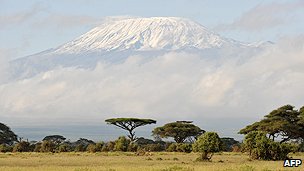jamii01
JF-Expert Member
- Oct 1, 2010
- 1,974
- 1,401
anzania has been spared the internal strife that has blighted many African states.
Though it remains one of the poorest countries in the world, with many of its people living below the World Bank poverty line, it has had some success in wooing donors and investors.
Tanzania assumed its present form in 1964 after a merger between the mainland Tanganyika and the island of Zanzibar, which had become independent the previous year.
Unlike many African countries, whose potential wealth contrasted with their actual poverty, Tanzania had few exportable minerals and a primitive agricultural system. To remedy this, its first president, Julius Nyerere, issued the 1967 Arusha Declaration, which called for self-reliance through the creation of cooperative farm villages and the nationalisation of factories, plantations, banks and private companies.
Continue reading the main storyAt a glance

Tanzania's economic woes were compounded in 1979 and 1981 by a costly military intervention to overthrow President Idi Amin of Uganda.
After Mr Nyerere's resignation in 1985, his successor, Ali Hassan Mwinyi, attempted to raise productivity and attract foreign investment and loans by dismantling government control of the economy.
This policy continued under Benjamin Mkapa, who was elected president in 1995. The economy grew, though at the price of painful fiscal reforms. Tourism is an important revenue earner; Tanzania's attractions include Africa's highest mountain, Kilimanjaro, and wildlife-rich national parks such as the Serengeti.
The political union between Zanzibar and mainland Tanzania has weathered more than four decades of change. Zanzibar has its own parliament and president.
Though it remains one of the poorest countries in the world, with many of its people living below the World Bank poverty line, it has had some success in wooing donors and investors.
Tanzania assumed its present form in 1964 after a merger between the mainland Tanganyika and the island of Zanzibar, which had become independent the previous year.
Unlike many African countries, whose potential wealth contrasted with their actual poverty, Tanzania had few exportable minerals and a primitive agricultural system. To remedy this, its first president, Julius Nyerere, issued the 1967 Arusha Declaration, which called for self-reliance through the creation of cooperative farm villages and the nationalisation of factories, plantations, banks and private companies.
Continue reading the main storyAt a glance

- Politics: Tanzania has enjoyed stability. Multi-party politics was introduced in 1992
- Economy: Annual growth rate has averaged 6.7% since 2006, one of the best in sub-Sahara Africa. Power supplies are erratic and fall short of demand. Gold earnings have been rising
- International: Tanzania hosts thousands of refugees from conflict in the neighbouring Great Lakes region
- Environment: Experts fear a planned highway threatens the Serengeti game park, Tanzania's biggest draw for tourism
Tanzania's economic woes were compounded in 1979 and 1981 by a costly military intervention to overthrow President Idi Amin of Uganda.
After Mr Nyerere's resignation in 1985, his successor, Ali Hassan Mwinyi, attempted to raise productivity and attract foreign investment and loans by dismantling government control of the economy.
This policy continued under Benjamin Mkapa, who was elected president in 1995. The economy grew, though at the price of painful fiscal reforms. Tourism is an important revenue earner; Tanzania's attractions include Africa's highest mountain, Kilimanjaro, and wildlife-rich national parks such as the Serengeti.
The political union between Zanzibar and mainland Tanzania has weathered more than four decades of change. Zanzibar has its own parliament and president.